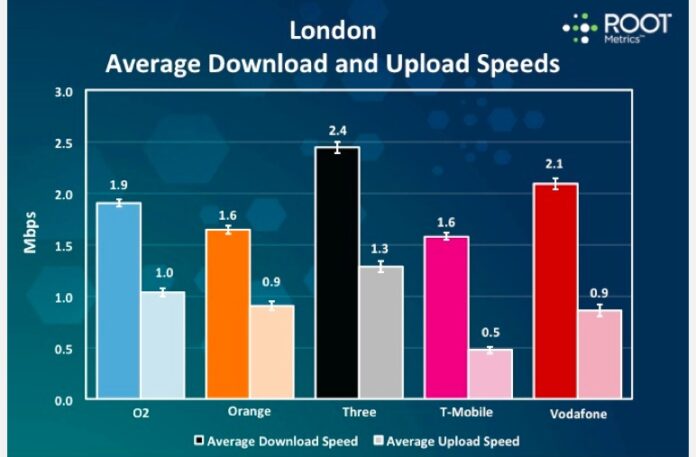Snodland, Chingford good. Guildford not so good.
Root Metrics has released details of a survey of mobile network performance in and around London and the South East. It found that for data and text performance Three UK was a “clear winner” in terms of overall performance, O2 was second, Vodafone third, Orange fourth and T-Mobile fifth*. On call (voice) performance it was impossible to declare an overall winner with only a four point difference between the scores.
One interesting aspect is the constraints that seem to be affecting all operators in Central London – almost certainly as a result of less demand and easier network deployment conditions. Certain commuter towns and villages also seem to fare significantly worse than others, with quite significant disparity between operators in certain locations – and between locations as a whole. Vodafone users in Guildford, it seems, have a right to feel unhappy.
A statement from Root Metrics said:
“For example, in Greater London, the fastest internet speed wasn’t to be found in the financial centre of the City or the media centre of Soho, but on Blackwood Ave in Chingford Mount where one test on O2 clocked a blistering 12.95 Mega-bits per second (Mbps). For London’s commuters, the sleepy village of Snodland, Kent returned the fastest speed with two tests recording 7.3 Mbps on Three’s network.
“Commuters living in Chelmsford, Maidstone and Guildford can also feel aggrieved that they get on average significantly slower mobile internet – across all networks – than people living in Watford, Slough and Dorking, although there are some specific exceptions; Vodafone for example being head and shoulders the quickest in Chelmsford – and quickest overall for Greater London – yet bottom of the league in Guildford.”
New York New York, so fast they named it twice
Root Metrics compared its London analysis with New York, and found that New Yorkers get 4x faster mobile data than Londoners, on average, for both upload and download. (For this comparison, only stats from the GLA London Boroughs were used, and not the outlying commuter towns etc).
RootMetrics CEO and President Bill Moore. “It’s quite amazing to find such a vast disparity in services between two cities that are rival destinations for global business and tourism.”
To evaluate the London area (as defined by Eurostat’s London Large Urban Zone) Root Metrics performed 70,846 call, mobile internet, and text tests, using its RootScout app running from off-the-shelf, Android-based smartphones purchased from mobile phone company stores. The phones were used as a typical consumer would use them and were not modified with any external antennas or other non-standard equipment. Tests were conducted from 12—21 September 2012.
*Root Metrics counts T-Mobile and Orange as two separate networks, instead of as EE, as it says this represents how the networks operate today.



